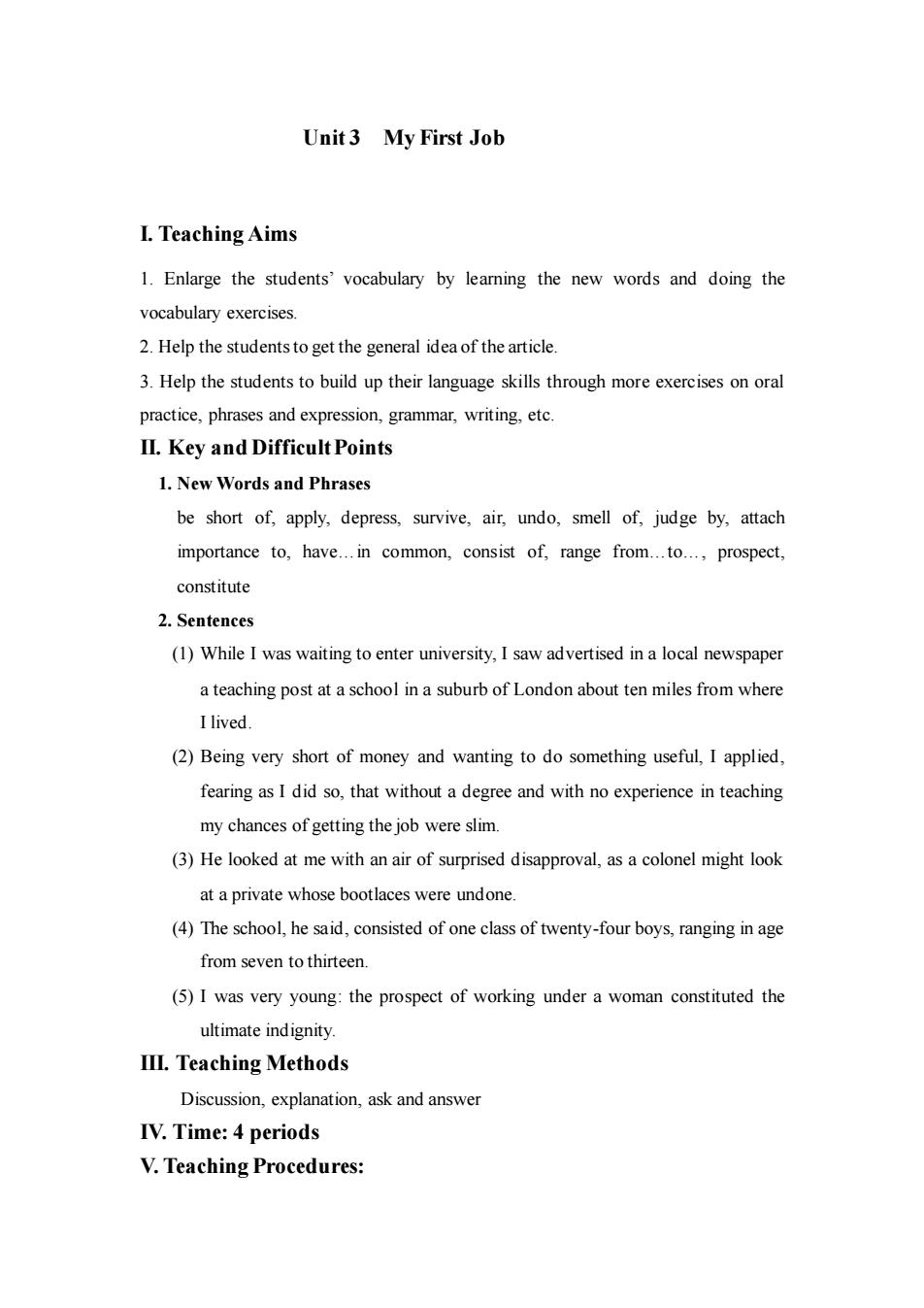
Unit3 My First Job I.Teaching Aims 1.Enlarge the students'vocabulary by learning the new words and doing the vocabulary exercises. 2.Help the studentsto get the general ideaof thearticle. 3.Help the students to build up their language skills through more exercises on oral practice,phrases and expression,grammar,writing,etc. II.Key and Difficult Points 1.New Words and Phrases be short of,apply,depress,survive,air,undo,smell of,judge by,attach importance to,have..in common,consist of,range from...to...prospect, constitute 2.Sentences (1)While I was waiting to enter university,I saw advertised in a local newspaper a teaching post at a school in a suburb of London about ten miles from where I lived. (2)Being very short of money and wanting to do something useful,I applied, fearing as I did so,that without a degree and with no experience in teaching my chances of getting the job were slim. (3)He looked at me with an air of surprised disapproval,as a colonel might look at a private whose bootlaces were undone (4)The school,he said,consisted of one class of twenty-four boys,ranging in age from seven to thirteen. (5)I was very young:the prospect of working under a woman constituted the ultimate indignity. III.Teaching Methods Discussion,explanation,ask and answer IV.Time:4 periods V.Teaching Procedures:
Unit 3 My First Job I. Teaching Aims 1. Enlarge the students’ vocabulary by learning the new words and doing the vocabulary exercises. 2. Help the students to get the general idea of the article. 3. Help the students to build up their language skills through more exercises on oral practice, phrases and expression, grammar, writing, etc. II. Key and Difficult Points 1. New Words and Phrases be short of, apply, depress, survive, air, undo, smell of, judge by, attach importance to, have…in common, consist of, range from…to…, prospect, constitute 2. Sentences (1) While I was waiting to enter university, I saw advertised in a local newspaper a teaching post at a school in a suburb of London about ten miles from where I lived. (2) Being very short of money and wanting to do something useful, I applied, fearing as I did so, that without a degree and with no experience in teaching my chances of getting the job were slim. (3) He looked at me with an air of surprised disapproval, as a colonel might look at a private whose bootlaces were undone. (4) The school, he said, consisted of one class of twenty-four boys, ranging in age from seven to thirteen. (5) I was very young: the prospect of working under a woman constituted the ultimate indignity. III. Teaching Methods Discussion, explanation, ask and answer IV. Time: 4 periods V. Teaching Procedures:
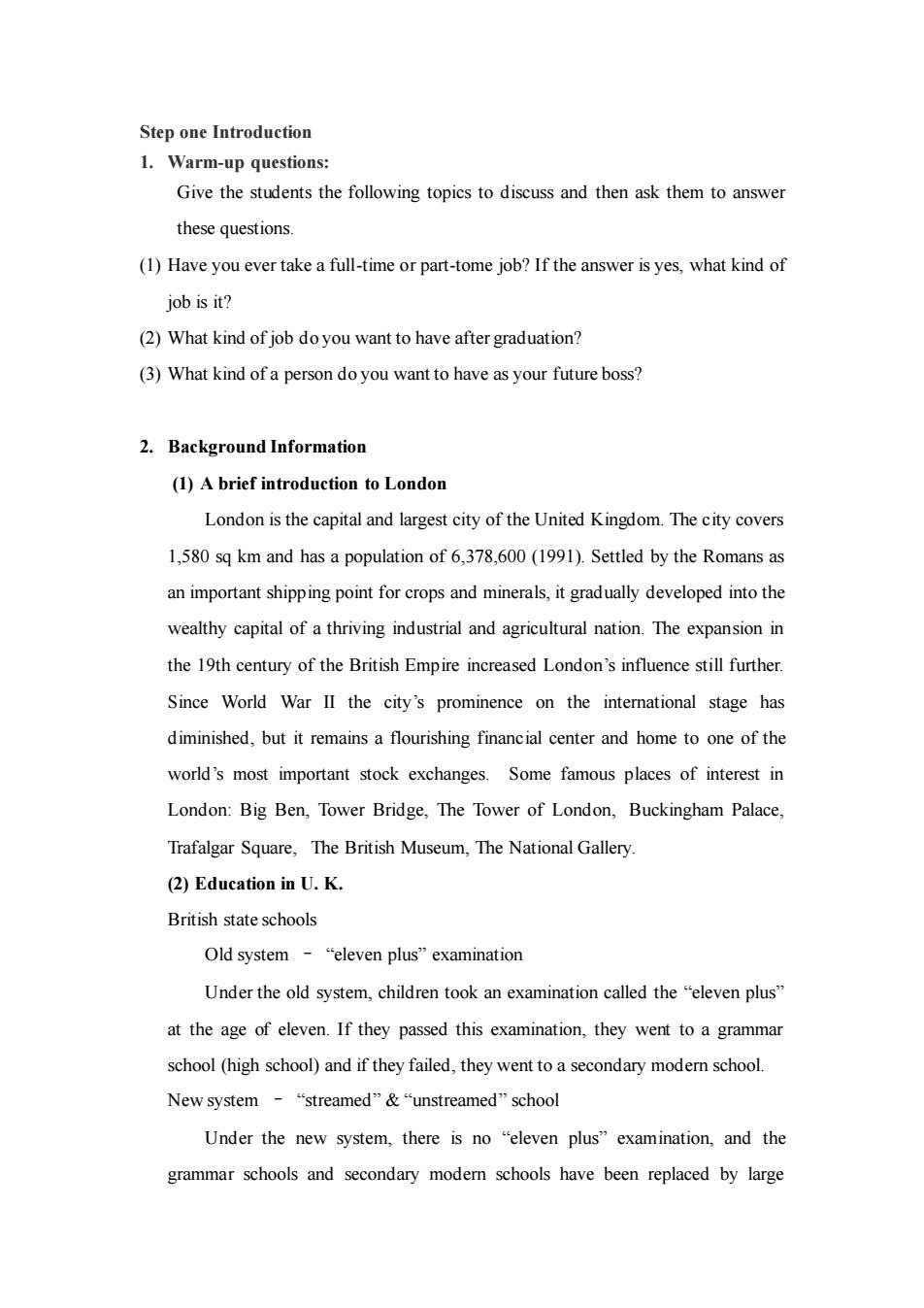
Step one Introduction 1.Warm-up questions Give the students the following topics to discuss and then ask them to answer these questions (1)Have you ever take a full-time or part-tome job?If the answer is yes,what kind of job is it? (2)What kind of job do you want to have after graduation? (3)What kind of a person do you want to have as your future boss? 2.Background Information (1)A brief introduction to London London is the capital and largest city of the United Kingdom.The city covers 1,580 sq km and has a population of 6,378,600(1991).Settled by the Romans as an important shipping point for crops and minerals,it gradually developed into the wealthy capital of a thriving industrial and agricultural nation.The expansion in the 19th century of the British Empire increased London's influence still further. Since World War II the city's prominence on the international stage has diminished,but it remains a flourishing financial center and home to one of the world's most important stock exchanges.Some famous places of interest in London:Big Ben,Tower Bridge,The Tower of London,Buckingham Palace, Trafalgar Square,The British Museum,The National Gallery. (2)Education in U.K. British state schools Old system-“eleven plus'”examination Under the old system,children took an examination called the "eleven plus" at the age of eleven.If they passed this examination,they went to a grammar school (high school)and if they failed,they went to a secondary modern school. New system-“streamed”&“unstreamed”school Under the new system.there is no "eleven plus"examination,and the grammar schools and secondary modem schools have been replaced by large
Step one Introduction 1. Warm-up questions: Give the students the following topics to discuss and then ask them to answer these questions. (1) Have you ever take a full-time or part-tome job? If the answer is yes, what kind of job is it? (2) What kind of job do you want to have after graduation? (3) What kind of a person do you want to have as your future boss? 2. Background Information (1) A brief introduction to London London is the capital and largest city of the United Kingdom. The city covers 1,580 sq km and has a population of 6,378,600 (1991). Settled by the Romans as an important shipping point for crops and minerals, it gradually developed into the wealthy capital of a thriving industrial and agricultural nation. The expansion in the 19th century of the British Empire increased London’s influence still further. Since World War II the city’s prominence on the international stage has diminished, but it remains a flourishing financial center and home to one of the world’s most important stock exchanges. Some famous places of interest in London: Big Ben, Tower Bridge, The Tower of London, Buckingham Palace, Trafalgar Square, The British Museum, The National Gallery. (2) Education in U. K. British state schools Old system – “eleven plus” examination Under the old system, children took an examination called the “eleven plus” at the age of eleven. If they passed this examination, they went to a grammar school (high school) and if they failed, they went to a secondary modern school. New system – “streamed” & “unstreamed” school Under the new system, there is no “eleven plus” examination, and the grammar schools and secondary modern schools have been replaced by large
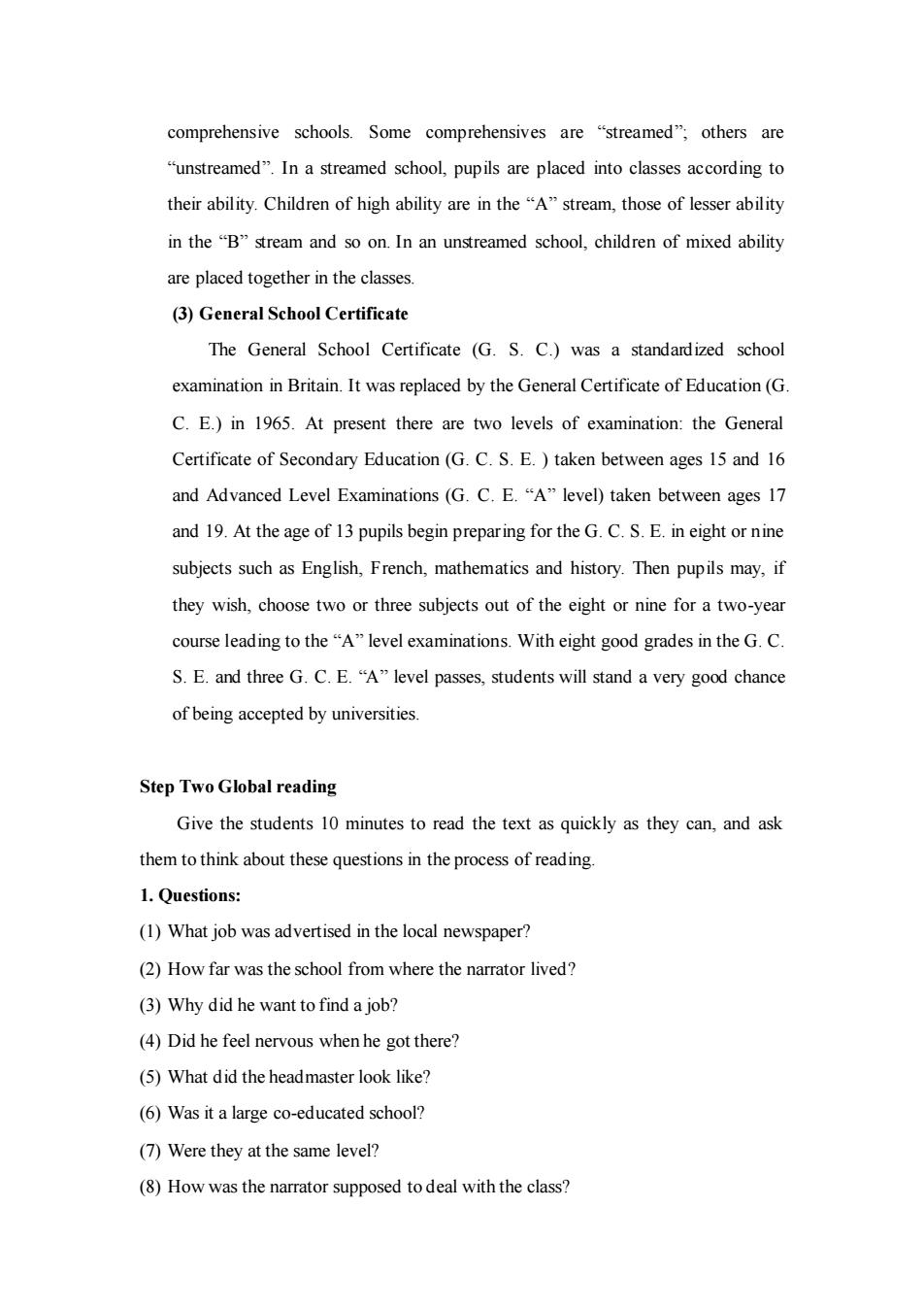
comprehensive schools.Some comprehensives are "streamed";others are "unstreamed".In a streamed school,pupils are placed into classes according to their ability.Children of high ability are in the"A"stream,those of lesser ability in the"B"stream and so on.In an unstreamed school,children of mixed ability are placed together in the classes. (3)General School Certificate The General School Certificate (G.S.C.)was a standardized school examination in Britain.It was replaced by the General Certificate of Education(G. C.E.)in 1965.At present there are two levels of examination:the General Certificate of Secondary Education(G.C.S.E.)taken between ages 15 and 16 and Advanced Level Examinations(G.C.E."A"level)taken between ages 17 and 19.At the age of 13 pupils begin preparing for the G.C.S.E.in eight or nine subjects such as English,French,mathematics and history.Then pupils may,if they wish.choose two or three subjects out of the eight or nine for a two-year course leading to the"A"level examinations.With eight good grades in the G.C. S.E.and three G.C.E."A"level passes,students will stand a very good chance of being accepted by universities Step Two Global reading Give the students 10 minutes to read the text as quickly as they can,and ask them to think about these questions in the process of reading 1.Questions: (1)What job was advertised in the local newspaper? (2)How far was the school from where the narrator lived? (3)Why did he want to find a job? (4)Did he feel nervous whenhe got there? (5)What did the headmaster look like? (6)Was it a large co-educated school? (7)Were they at the same level? (8)How was the narrator supposed to deal with the class?
comprehensive schools. Some comprehensives are “streamed”; others are “unstreamed”. In a streamed school, pupils are placed into classes according to their ability. Children of high ability are in the “A” stream, those of lesser ability in the “B” stream and so on. In an unstreamed school, children of mixed ability are placed together in the classes. (3) General School Certificate The General School Certificate (G. S. C.) was a standardized school examination in Britain. It was replaced by the General Certificate of Education (G. C. E.) in 1965. At present there are two levels of examination: the General Certificate of Secondary Education (G. C. S. E. ) taken between ages 15 and 16 and Advanced Level Examinations (G. C. E. “A” level) taken between ages 17 and 19. At the age of 13 pupils begin preparing for the G. C. S. E. in eight or nine subjects such as English, French, mathematics and history. Then pupils may, if they wish, choose two or three subjects out of the eight or nine for a two-year course leading to the “A” level examinations. With eight good grades in the G. C. S. E. and three G. C. E. “A” level passes, students will stand a very good chance of being accepted by universities. Step Two Global reading Give the students 10 minutes to read the text as quickly as they can, and ask them to think about these questions in the process of reading. 1. Questions: (1) What job was advertised in the local newspaper? (2) How far was the school from where the narrator lived? (3) Why did he want to find a job? (4) Did he feel nervous when he got there? (5) What did the headmaster look like? (6) Was it a large co-educated school? (7) Were they at the same level? (8) How was the narrator supposed to deal with the class?
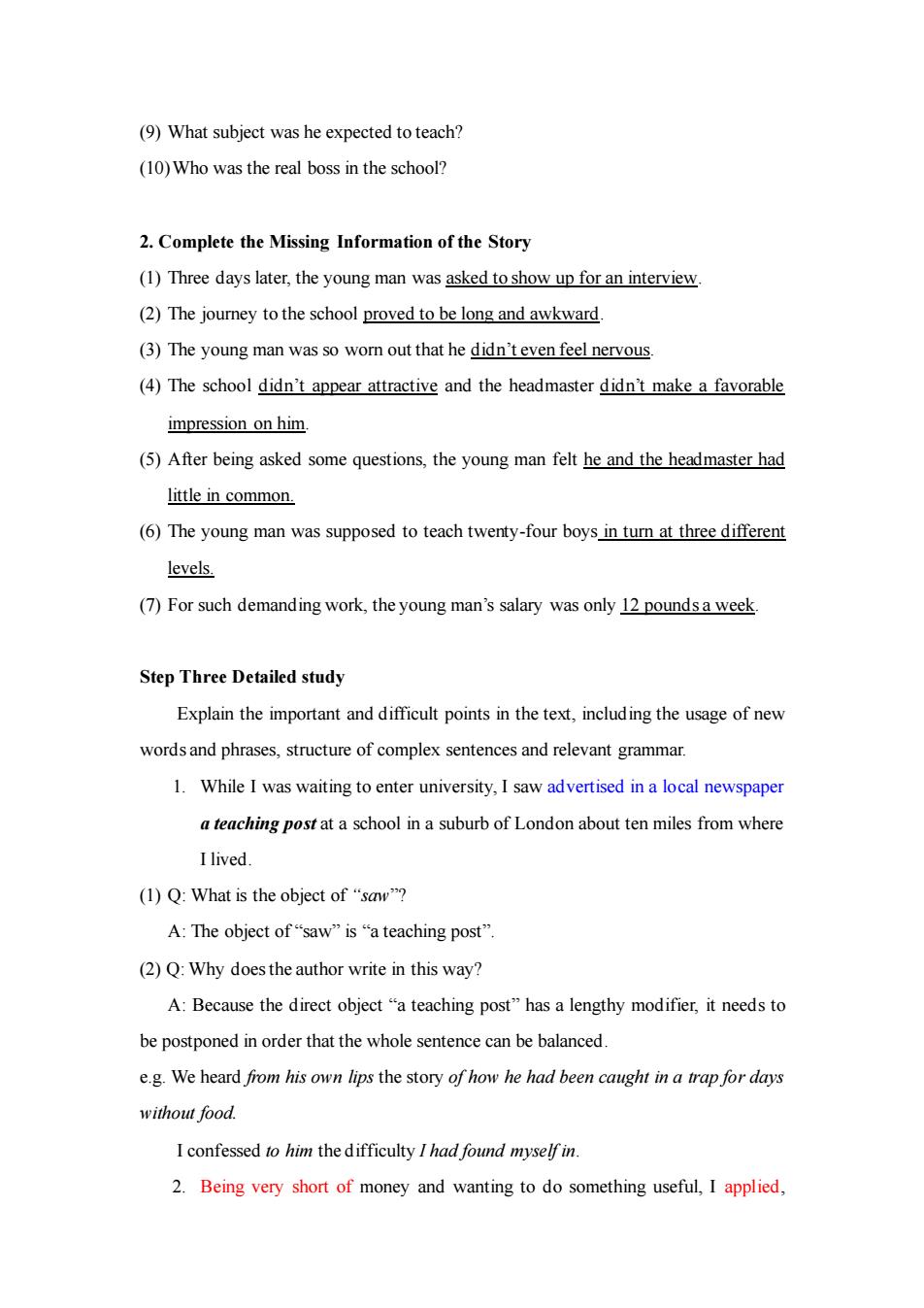
(9)What subject was he expected to teach? (10)Who was the real boss in the school? 2.Complete the Missing Information of the Story (1)Three days later,the young man was asked to show up for an interview. (2)The joumey to the school proved to be long and awkward (3)The young man was so wom out that he didn'teven feel nervous. (4)The school didn't appear attractive and the headmaster didn't make a favorable impression on him. (5)After being asked some questions,the young man felt he and the headmaster had little in common. (6)The young man was supposed to teach twenty-four boys in tum at three different levels. (7)For such demanding work,the young man's salary was only 12 poundsa week Step Three Detailed study Explain the important and difficult points in the text,including the usage of new words and phrases,structure of complex sentences and relevant grammar 1.While I was waiting to enter university,I saw advertised in a local newspaper a teaching post at a school in a suburb of London about ten miles from where I lived. (1)Q:What is the object of"sa? A:The object of“saw”is“a teaching post” (2)Q:Why does the author write in this way? A:Because the direct object"a teaching post"has a lengthy modifier,it needs to be postponed in order that the whole sentence can be balanced e.g.We heard from his own lips the story of how he had been caught in a trap for days without food. I confessed to him the difficulty I had found myself in 2.Being very short of money and wanting to do something useful,I applied
(9) What subject was he expected to teach? (10)Who was the real boss in the school? 2. Complete the Missing Information of the Story (1) Three days later, the young man was asked to show up for an interview. (2) The journey to the school proved to be long and awkward. (3) The young man was so worn out that he didn’t even feel nervous. (4) The school didn’t appear attractive and the headmaster didn’t make a favorable impression on him. (5) After being asked some questions, the young man felt he and the headmaster had little in common. (6) The young man was supposed to teach twenty-four boys in turn at three different levels. (7) For such demanding work, the young man’s salary was only 12 pounds a week. Step Three Detailed study Explain the important and difficult points in the text, including the usage of new words and phrases, structure of complex sentences and relevant grammar. 1. While I was waiting to enter university, I saw advertised in a local newspaper a teaching post at a school in a suburb of London about ten miles from where I lived. (1) Q: What is the object of “saw”? A: The object of “saw” is “a teaching post”. (2) Q: Why does the author write in this way? A: Because the direct object “a teaching post” has a lengthy modifier, it needs to be postponed in order that the whole sentence can be balanced. e.g. We heard from his own lips the story of how he had been caught in a trap for days without food. I confessed to him the difficulty I had found myself in. 2. Being very short of money and wanting to do something useful, I applied
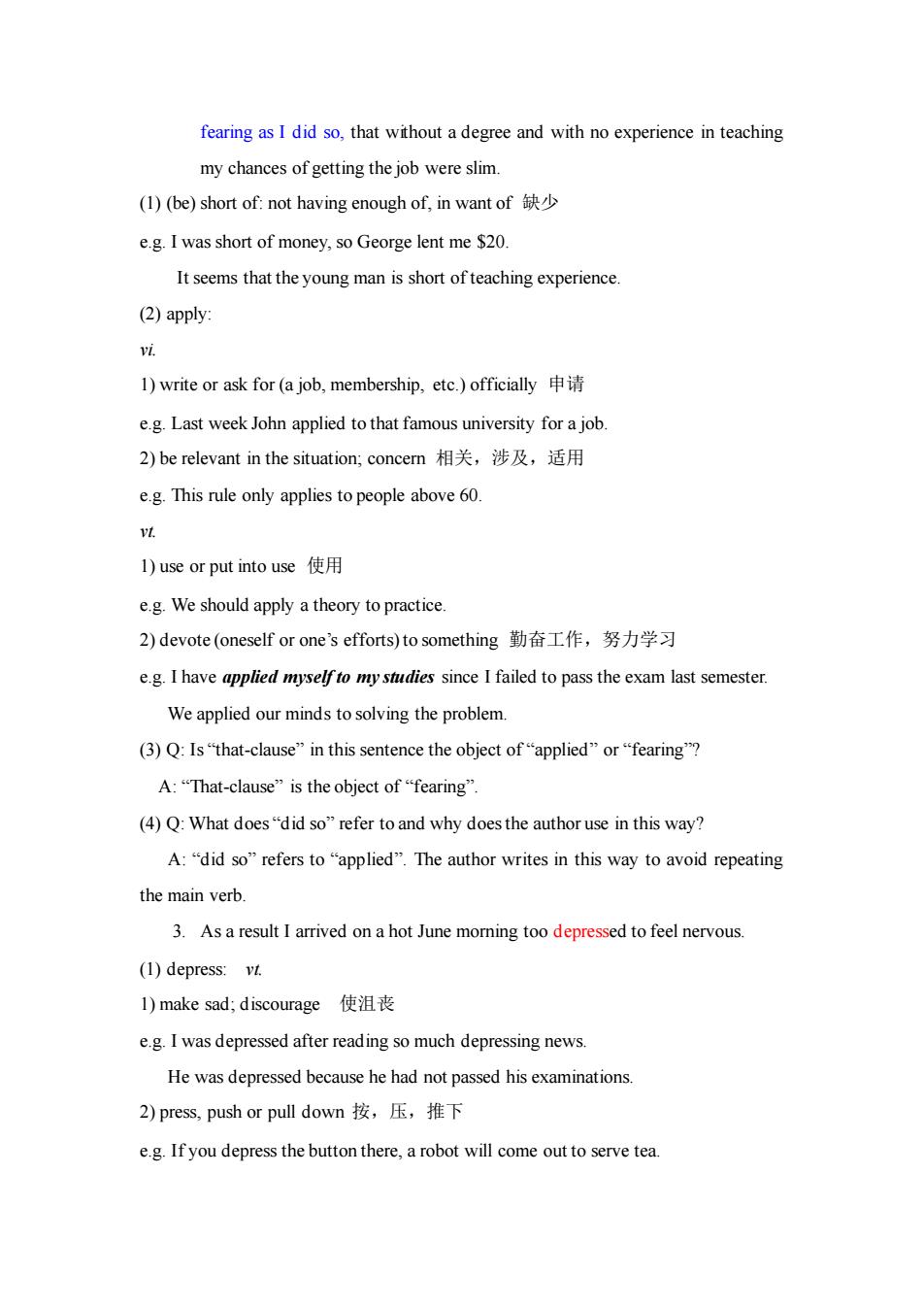
fearing as I did so,that without a degree and with no experience in teaching my chances of getting the job were slim. (1)(be)short of:not having enough of,in want of e.g.I was short of money,so George lent me $20. It seems that the young man is short of teaching experience. (2)apply: 1)write or ask for (a job,membership,etc.)officially e.g.Last week John applied to that famous university for a job. 2)be relevant in the situation;concem相关,涉及,适用 e.g.This rule only applies to people above 60. l)use or put into use使用 e.g.We should apply a theory to practice. 2)devote(oneself or one's efforts)to something勤奋工作,努力学习 e.g.I have applied myselfto mystudies since I failed to pass the exam last semester. We applied our minds to solving the problem (3)Q:Is"that-clause"in this sentence the object of"applied"or"fearing"? A:"That-clause”is the object of“fearing”. (4)Q:What does"did so"refer to and why does the authoruse in this way? A:"did so"refers to"applied".The author writes in this way to avoid repeating the main verb. 3.Asa result I arrived on a hot June moming too depressed to feel nervous. (1)depress:vL I)make sad,discourage使沮丧 e.g.I was depressed after reading so much depressing news. He was depressed because he had not passed his examinations. 2)press,.push or pull down按,压,推下 e.g.If you depress the button there,a robot will come out to serve tea
fearing as I did so, that without a degree and with no experience in teaching my chances of getting the job were slim. (1) (be) short of: not having enough of, in want of 缺少 e.g. I was short of money, so George lent me $20. It seems that the young man is short of teaching experience. (2) apply: vi. 1) write or ask for (a job, membership, etc.) officially 申请 e.g. Last week John applied to that famous university for a job. 2) be relevant in the situation; concern 相关,涉及,适用 e.g. This rule only applies to people above 60. vt. 1) use or put into use 使用 e.g. We should apply a theory to practice. 2) devote (oneself or one’s efforts) to something 勤奋工作,努力学习 e.g. I have applied myself to my studies since I failed to pass the exam last semester. We applied our minds to solving the problem. (3) Q: Is “that-clause” in this sentence the object of “applied” or “fearing”? A: “That-clause” is the object of “fearing”. (4) Q: What does “did so” refer to and why does the author use in this way? A: “did so” refers to “applied”. The author writes in this way to avoid repeating the main verb. 3. As a result I arrived on a hot June morning too depressed to feel nervous. (1) depress: vt. 1) make sad; discourage 使沮丧 e.g. I was depressed after reading so much depressing news. He was depressed because he had not passed his examinations. 2) press, push or pull down 按,压,推下 e.g. If you depress the button there, a robot will come out to serve tea

3)make lower降低,减少 e.g.The OPEC countries depressed their oil output a month ago. (2)Meaning:Therefore when I got to the school on a hot morning in June I was in such low spirits that I did not and could not feel any anxiety of fear at all (3)Q:What can we infer from this sentence? A:The journey from his home to the school was very bad. 4....they struggled to survive the dust and the fumes from a busy main road. ()survive:v.stay alive inor despite,live or exist longer than幸存,存话,比…活 得长 e.g.The crops survived the drought. The man survived his wife by many years (2)Meaning:The evergreen shrubs tried hard to stay alive in the dust and fumes from a main road with very busy traffic. 5.He looked at me with an air of surprised disapproval,as a colonel might look at a private whose bootlaces were undone. ()air:appearance,,manner表情,神态 e.g.He always talks with an air of self-importance. The room has an air of luxury. (2)undo:vt. I)unfasten(what is tied or wrapped);untie解开,松开 e.g.Let me help you undo the buttonson that jacket. 2)to cancel the effect of sth.取消,废止(某事的影响 e.g.What is done cannot be undone. The new President undid many rules set up by the former President The prefix"un-"has a negative meaning.See P60 6.The narrow,sunless hall smelled unpleasantly of stale cabbage;the walls were dirty with ink marks;it was all silent. smell of:give out the smell or scent of散发,有.气味 e.g.The garden smells of roses. His breath smelled of garlic
3) make lower 降低,减少 e.g. The OPEC countries depressed their oil output a month ago. (2) Meaning: Therefore when I got to the school on a hot morning in June I was in such low spirits that I did not and could not feel any anxiety of fear at all. (3) Q: What can we infer from this sentence? A: The journey from his home to the school was very bad. 4. …they struggled to survive the dust and the fumes from a busy main road. (1) survive: v. stay alive in or despite; live or exist longer than 幸存,存活,比…活 得长 e.g. The crops survived the drought. The man survived his wife by many years (2) Meaning: The evergreen shrubs tried hard to stay alive in the dust and fumes from a main road with very busy traffic. 5. He looked at me with an air of surprised disapproval, as a colonel might look at a private whose bootlaces were undone. (1) air: appearance, manner 表情,神态 e.g. He always talks with an air of self-importance. The room has an air of luxury. (2) undo: vt. 1) unfasten (what is tied or wrapped); untie 解开,松开 e.g. Let me help you undo the buttons on that jacket. 2) to cancel the effect of sth. 取消,废止(某事的影响) e.g. What is done cannot be undone. The new President undid many rules set up by the former President. The prefix “un-” has a negative meaning. See P60. 6. The narrow, sunless hall smelled unpleasantly of stale cabbage; the walls were dirty with ink marks; it was all silent. smell of: give out the smell or scent of 散发,有…气味 e.g. The garden smells of roses. His breath smelled of garlic
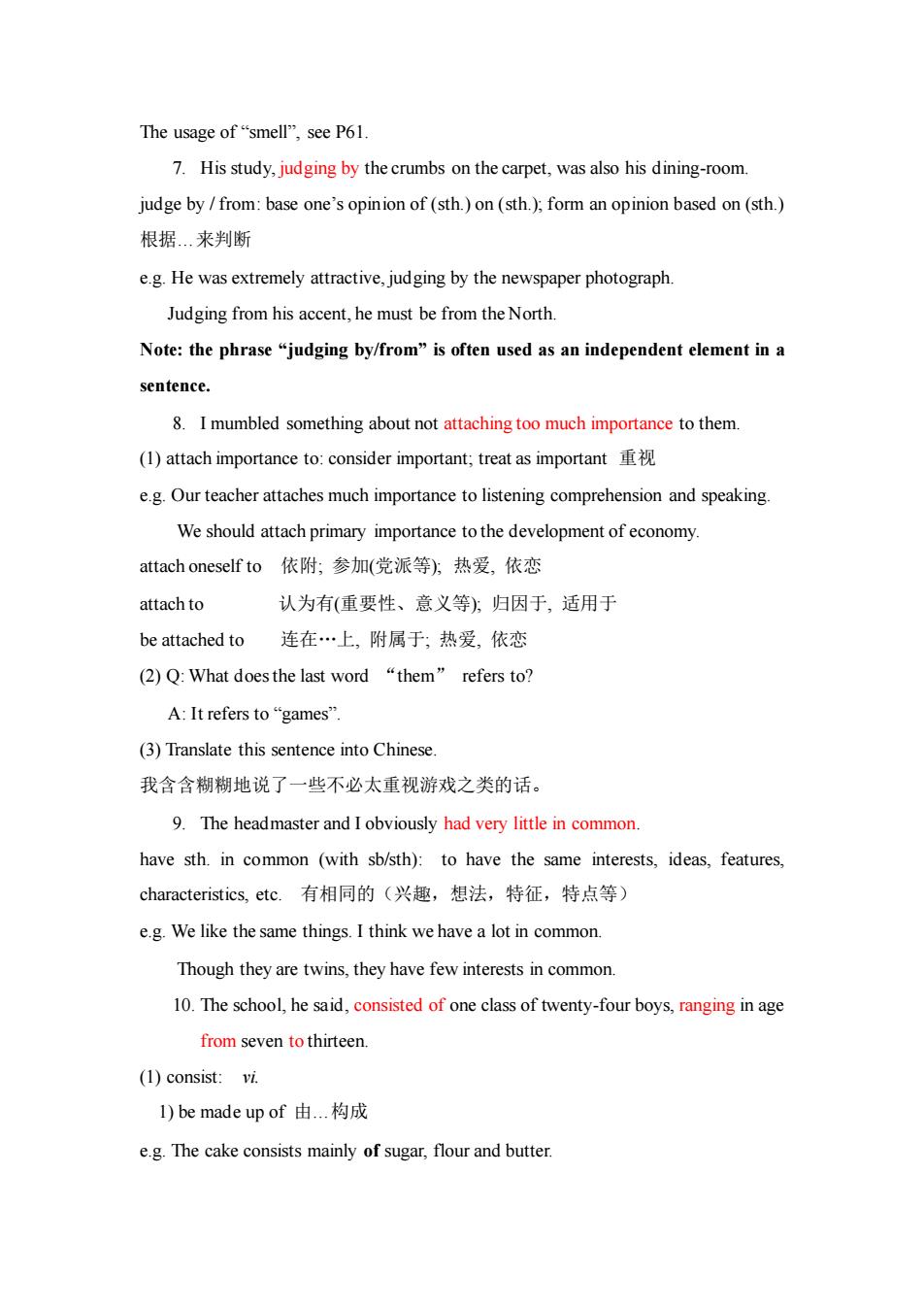
The usage of"smell",see P61. 7.His study,judging by the crumbs on the carpet,was also his dining-room. judge by/from:base one's opinion of(sth.)on(sth.),form an opinion based on(sth.) 根据…来判断 e.g.He was extremely attractive,judging by the newspaper photograph. Judging from his accent,he must be from the North. Note:the phrase "judging by/from"is often used as an independent element in a sentence. 8.I mumbled something about not attaching too much importance to them. (1)attach importance to:consider important:treat as important e.g.Our teacher attaches much importance to listening comprehension and speaking. We should attach primary importance to the development of economy. attach oneself to依附;参加(党派等),热爱,依恋 attach to 认为有(重要性、意义等,归因于,适用于 be attached to连在…上,附属于,热爱,依恋 (2)Q:What does the last word“them”refers to2 A:It refers to“games” (3)Translate this sentence into Chinese. 我含含糊糊地说了一些不必太重视游戏之类的话。 9.The headmaster and Iobviously had very little in common. have sth.in common (with sb/sth):to have the same interests,ideas,features characteristics,.etc,有相同的(兴趣,想法,特征,特点等) e.g.We like the same things.I think we have a lot in common. Though they are twins,they have few interests in common 10.The school,he said,consisted of one class of twenty-four boys,ranging in age from seven to thirteen. (1)consist:vi. I)be made up of由..构成 e.g.The cake consists mainly of sugar,flour and butter
The usage of “smell”, see P61. 7. His study, judging by the crumbs on the carpet, was also his dining-room. judge by / from: base one’s opinion of (sth.) on (sth.); form an opinion based on (sth.) 根据…来判断 e.g. He was extremely attractive, judging by the newspaper photograph. Judging from his accent, he must be from the North. Note: the phrase “judging by/from” is often used as an independent element in a sentence. 8. I mumbled something about not attaching too much importance to them. (1) attach importance to: consider important; treat as important 重视 e.g. Our teacher attaches much importance to listening comprehension and speaking. We should attach primary importance to the development of economy. attach oneself to 依附; 参加(党派等); 热爱, 依恋 attach to 认为有(重要性、意义等); 归因于, 适用于 be attached to 连在…上, 附属于; 热爱, 依恋 (2) Q: What does the last word “them” refers to? A: It refers to “games”. (3) Translate this sentence into Chinese. 我含含糊糊地说了一些不必太重视游戏之类的话。 9. The headmaster and I obviously had very little in common. have sth. in common (with sb/sth): to have the same interests, ideas, features, characteristics, etc. 有相同的(兴趣,想法,特征,特点等) e.g. We like the same things. I think we have a lot in common. Though they are twins, they have few interests in common. 10. The school, he said, consisted of one class of twenty-four boys, ranging in age from seven to thirteen. (1) consist: vi. 1) be made up of 由…构成 e.g. The cake consists mainly of sugar, flour and butter
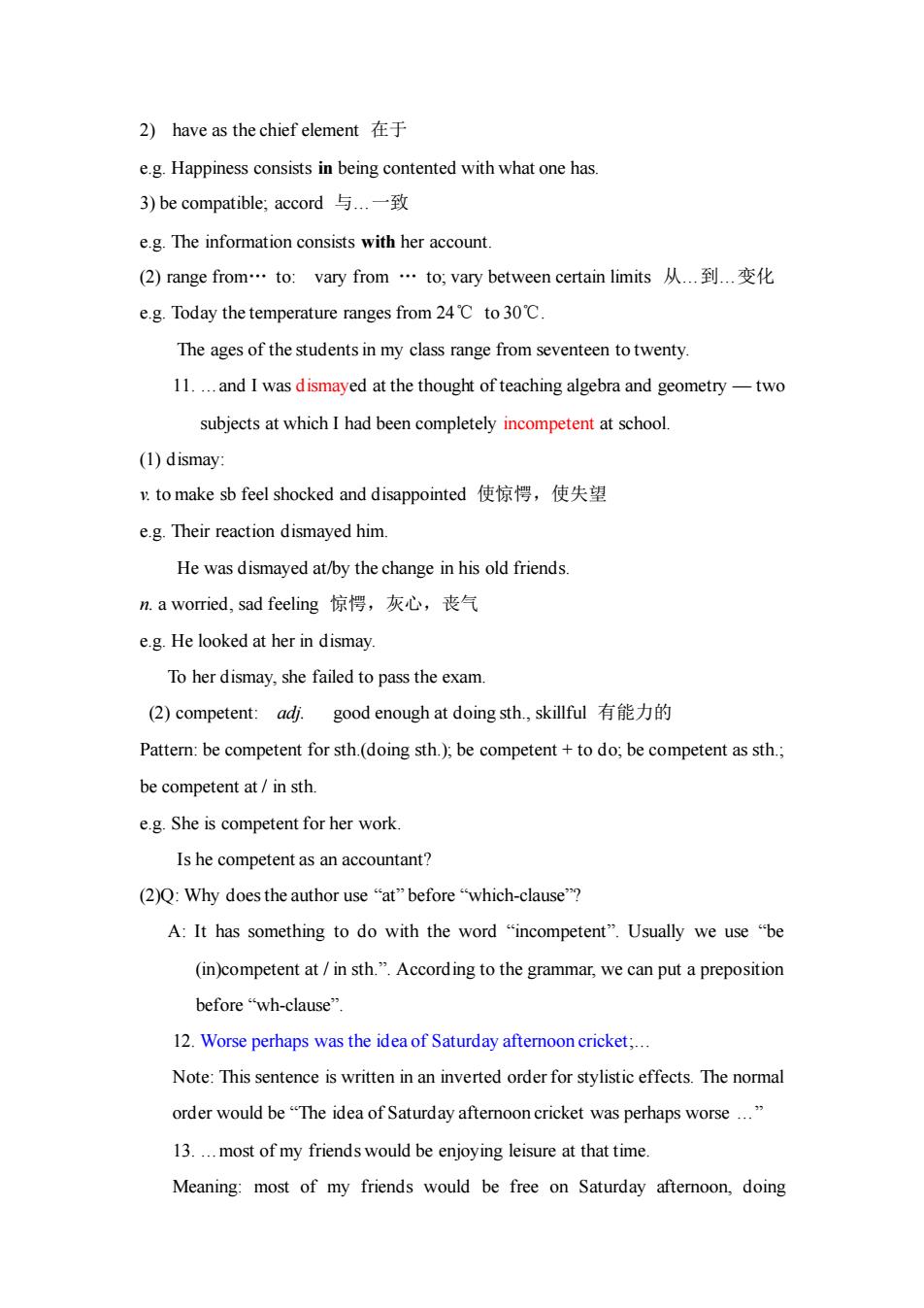
2)have as the chiefelement在于 e.g.Happiness consists in being contented with what one has. 3)be compatible;accord与.一致 e.g.The information consists with her account. (2)range from…to:vary from…to,vary between certain limits从到变化 e.g.Today the temperature ranges from 24C to30'C. The ages of the students in my class range from seventeen to twenty 11....and I was dismayed at the thought of teaching algebra and geometry-two subjects at which I had been completely incompetent at school. (1)dismay to make sb feel shocked and disappointed使惊愕,使失望 e.g.Their reaction dismayed him. He was dismayed at/by the change in his old friends. n.a worried,sad feeling惊愕,灰心,丧气 e.g.He looked at her in dismay. To her dismay,she failed to pass the exam. (2)competent:adi. ,good enough at doing sth.,skillful有能力的 Patter:be competent for sth.(doing sth.);be competent+to do,be competent as sth. be competent at in sth. e.g.She is competent for her work. Is he competent as an accountant? (2)Q:Why does the author use"at"before"which-clause"? A:It has something to do with the word“incompetent'”.Usually we use“be (in)competent at/in sth.".According to the grammar,we can put a preposition before“wh-clause' 12.Worse perhaps was the idea of Saturday aftemnoon cricket;. Note:This sentence is written in an inverted order for stylistic effects.The normal order would be"The idea of Saturday afternoon cricket was perhaps worse..." 13....most of my friends would be enjoying leisure at that time Meaning:most of my friends would be free on Saturday aftemoon,doing
2) have as the chief element 在于 e.g. Happiness consists in being contented with what one has. 3) be compatible; accord 与…一致 e.g. The information consists with her account. (2) range from… to: vary from … to; vary between certain limits 从…到…变化 e.g. Today the temperature ranges from 24℃ to 30℃. The ages of the students in my class range from seventeen to twenty. 11. …and I was dismayed at the thought of teaching algebra and geometry — two subjects at which I had been completely incompetent at school. (1) dismay: v. to make sb feel shocked and disappointed 使惊愕,使失望 e.g. Their reaction dismayed him. He was dismayed at/by the change in his old friends. n. a worried, sad feeling 惊愕,灰心,丧气 e.g. He looked at her in dismay. To her dismay, she failed to pass the exam. (2) competent: adj. good enough at doing sth., skillful 有能力的 Pattern: be competent for sth.(doing sth.); be competent + to do; be competent as sth.; be competent at / in sth. e.g. She is competent for her work. Is he competent as an accountant? (2)Q: Why does the author use “at” before “which-clause”? A: It has something to do with the word “incompetent”. Usually we use “be (in)competent at / in sth.”. According to the grammar, we can put a preposition before “wh-clause”. 12. Worse perhaps was the idea of Saturday afternoon cricket;… Note: This sentence is written in an inverted order for stylistic effects. The normal order would be “The idea of Saturday afternoon cricket was perhaps worse …” 13. …most of my friends would be enjoying leisure at that time. Meaning: most of my friends would be free on Saturday afternoon, doing
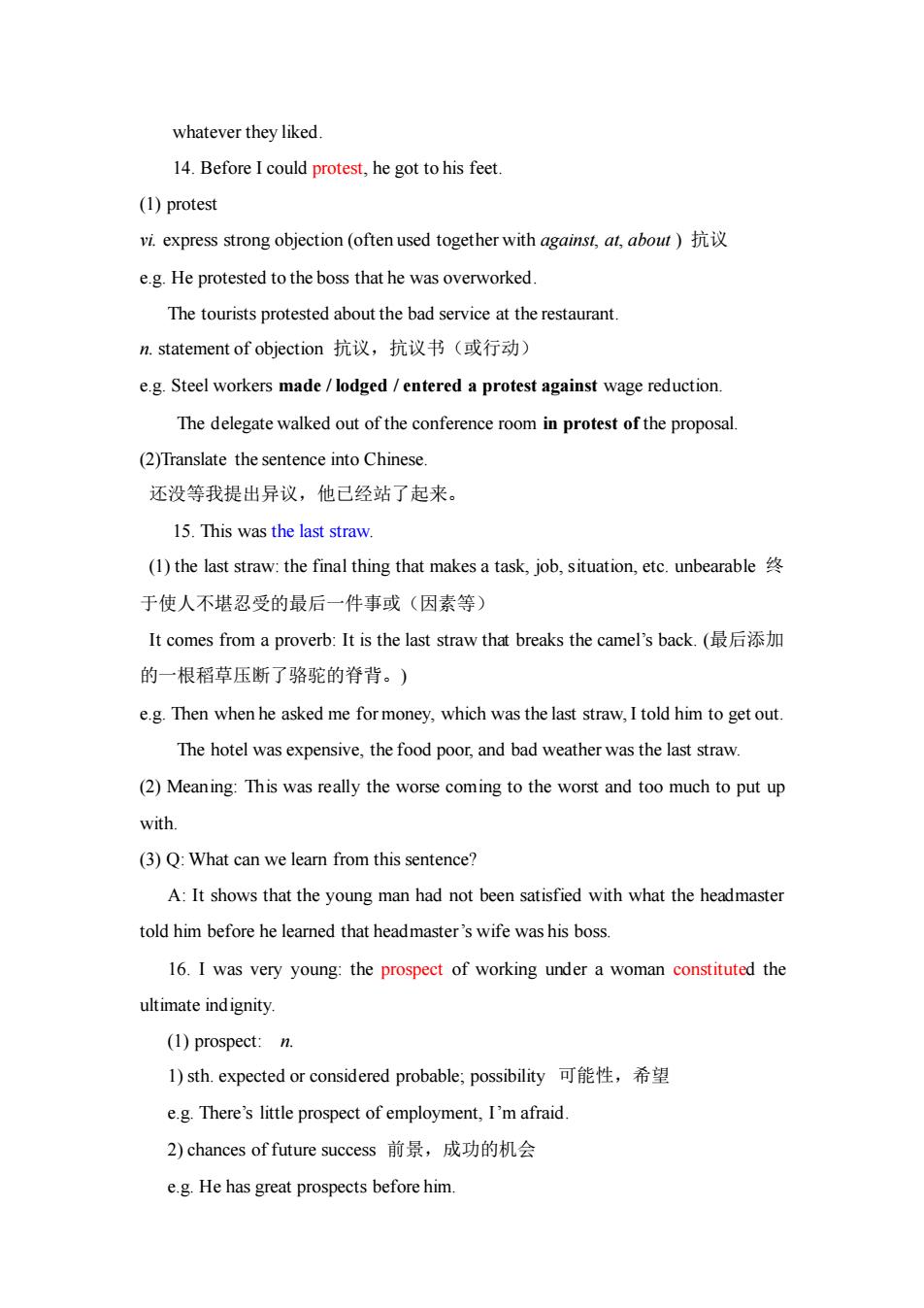
whatever they liked. 14.Before I could protest,he got to his feet. (1)protest vi.express strong objection (often used together with against,at,about) e.g.He protested to the boss that he was overworked. The tourists protested about the bad service at the restaurant. n.statement of objection抗议,抗议书(或行动) e.g.Steel workers made/lodged /entered a protest against wage reduction. The delegate walked out of the conference room in protest of the proposal. (2)Translate the sentence into Chinese. 还没等我提出异议,他已经站了起来 15.This was the last straw. (1)the last straw:the final thing that makes a task,job,situation,etc.unbearable 于使人不堪忍受的最后一件事或(因素等) It comes from a proverb:It is the last straw that breaks the camel's back.(最后添加 的一根稻草压断了骆驼的脊背。) e.g.Then when he asked me for money,which was the last straw,I told him to get out. The hotel was expensive,the food poor,and bad weather was the last straw. (2)Meaning:This was really the worse coming to the worst and too much to put up with. (3)Q:What can we learn from this sentence? A:It shows that the young man had not been satisfied with what the headmaster told him before he learned that headmaster's wife was his boss. 16.I was very young:the prospect of working under a woman constituted the umate indignity. (1)prospect:n. l)sth.expected or considered probable;possibility可能性,希望 e.g.There's little prospect of employment,I'm afraid. 2)chances of future success前景,成功的机会 e.g.He has great prospects before him
whatever they liked. 14. Before I could protest, he got to his feet. (1) protest vi. express strong objection (often used together with against, at, about ) 抗议 e.g. He protested to the boss that he was overworked. The tourists protested about the bad service at the restaurant. n. statement of objection 抗议,抗议书(或行动) e.g. Steel workers made / lodged / entered a protest against wage reduction. The delegate walked out of the conference room in protest of the proposal. (2)Translate the sentence into Chinese. 还没等我提出异议,他已经站了起来。 15. This was the last straw. (1) the last straw: the final thing that makes a task, job, situation, etc. unbearable 终 于使人不堪忍受的最后一件事或(因素等) It comes from a proverb: It is the last straw that breaks the camel’s back. (最后添加 的一根稻草压断了骆驼的脊背。) e.g. Then when he asked me for money, which was the last straw, I told him to get out. The hotel was expensive, the food poor, and bad weather was the last straw. (2) Meaning: This was really the worse coming to the worst and too much to put up with. (3) Q: What can we learn from this sentence? A: It shows that the young man had not been satisfied with what the headmaster told him before he learned that headmaster’s wife was his boss. 16. I was very young: the prospect of working under a woman constituted the ultimate indignity. (1) prospect: n. 1) sth. expected or considered probable; possibility 可能性,希望 e.g. There’s little prospect of employment, I’m afraid. 2) chances of future success 前景,成功的机会 e.g. He has great prospects before him
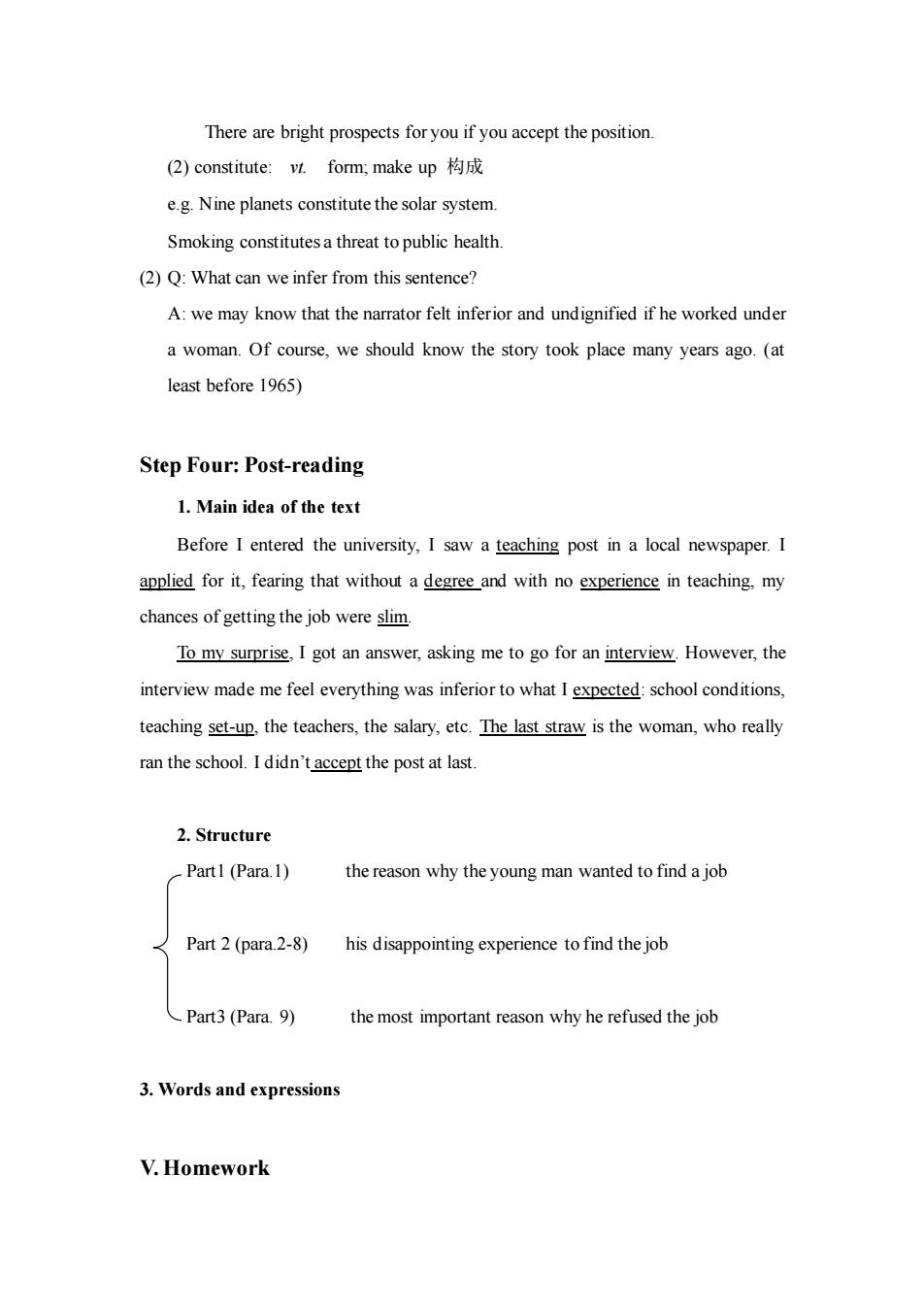
There are bright prospects for you if you accept the position. (2)constitute:t.fom;make up构成 e.g.Nine planets constitute the solar system. Smoking constitutesa threat to public health (2)Q:What can we infer from this sentence? A:we may know that the narrator felt inferior and undignified if he worked under a woman.Of course,we should know the story took place many years ago.(at least before 1965) Step Four:Post-reading 1.Main idea of the tex Before I entered the university,I saw a teaching post in a local newspaper.I applied for it,fearing that withou a degree and with no experience in teaching.my chances of getting the job were slim. To my surprise,I got an answer,asking me to go for an interview.However,the interview made me feel everything was inferior to what I expected:school conditions, teaching set-up,the teachers,the salary,ete.The last straw is the woman,who really ran the school.I didn'taccept the post at last 2.Structure PartI(Para.1) the reason why the young man wanted to find a job Part 2(para.2-8)his disappointing experience to find the job Part3(Para.9) the most important reason why he refused the job 3.Words and expressions V.Homework
There are bright prospects for you if you accept the position. (2) constitute: vt. form; make up 构成 e.g. Nine planets constitute the solar system. Smoking constitutes a threat to public health. (2) Q: What can we infer from this sentence? A: we may know that the narrator felt inferior and undignified if he worked under a woman. Of course, we should know the story took place many years ago. (at least before 1965) Step Four: Post-reading 1. Main idea of the text Before I entered the university, I saw a teaching post in a local newspaper. I applied for it, fearing that without a degree and with no experience in teaching, my chances of getting the job were slim. To my surprise, I got an answer, asking me to go for an interview. However, the interview made me feel everything was inferior to what I expected: school conditions, teaching set-up, the teachers, the salary, etc. The last straw is the woman, who really ran the school. I didn’t accept the post at last. 2. Structure Part1 (Para.1) the reason why the young man wanted to find a job Part 2 (para.2-8) his disappointing experience to find the job Part3 (Para. 9) the most important reason why he refused the job 3. Words and expressions V. Homework